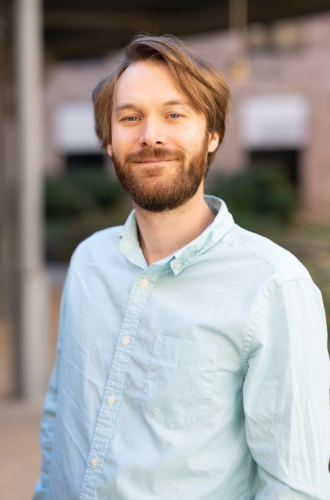-

-

-
Scott Kravitz
Assistant Professor
Department of PhysicsExperimental particle physics, High energy physics, Dark matter direct detection, Machine learning, Rare event searches-
I am an experimental particle physicist. My goal is to detect dark matter here on Earth for the first time and to understand what it is made of at the particle level. My current efforts center on using large, exceptionally low-background particle detectors called xenon time projection chambers to observe incredibly rare interactions between them and the dark matter continually passing through us.
One way I do this is as a collaborator on the LUX-ZEPLIN (LZ) dark matter experiment: an international collaboration which recently set world-leading limits searching for weakly interacting massive particles (WIMPs), one of the best-motivated theories of dark matter. The LZ detector is housed a mile underground in Lead, South Dakota to reduce background events from cosmic particles and has been taking data since late 2021. Over the next few years, it is expected to improve its sensitivity to dark matter relative to its initial findings by several times, enabling it to discover or rule out some of the most interesting dark matter models. My contributions to LZ so far have primarily been through development and validation of fast simulation software and through application of machine learning methods to LZ data to expand both the range of dark matter models that can be probed and the sensitivity of such searches.
I am also interested in developing new particle detector methods to enable the next generation of dark matter experiments. In particular, I am working on a concept to upgrade the LZ experiment after its completion using the novel solid xenon time projection chamber technology I have helped develop, to achieve an experiment limited only by rare neutrino backgrounds. This requires establishing the technique on a large scale, and for this I am working on a solid xenon test bed capable of observing and monitoring the cryogenic growth of large xenon crystals and using them for sensitive particle detection.
Looking further toward the future, I have joined the XLZD dark matter consortium, which aims to combine the world's leading xenon dark matter experimenters to build a many-tonne dark matter detector capable of achieving unparalleled sensitivity to dark matter as well as other rare processes such as neutrinoless double beta decay and solar neutrino interactions. This also aligns with my past work on the EXO-200 and nEXO neutrinoless double beta decay experiments and my continued interest in neutrino physics.
Past positions:
Owen Chamberlain Postdoctoral Fellow, Lawrence Berkeley National Lab (2017-2023)
Ph.D., Stanford University (2011-2017)
B.S., Rice University (2007-2011)
-





